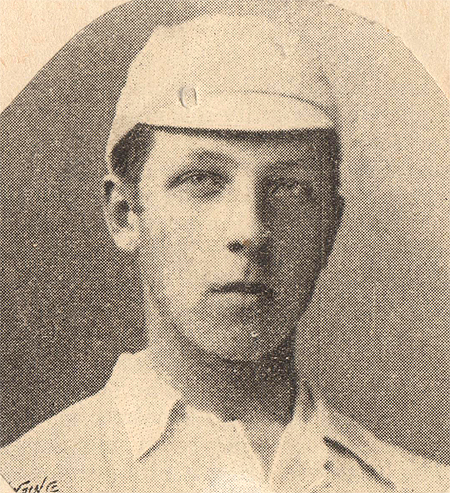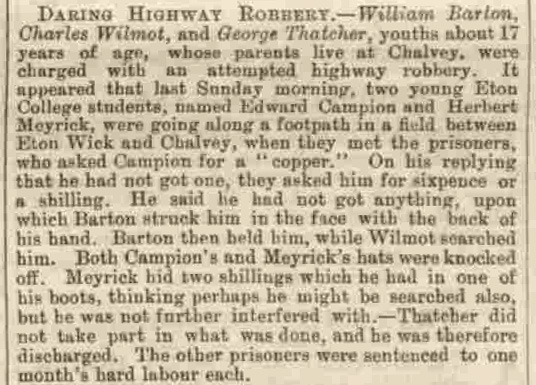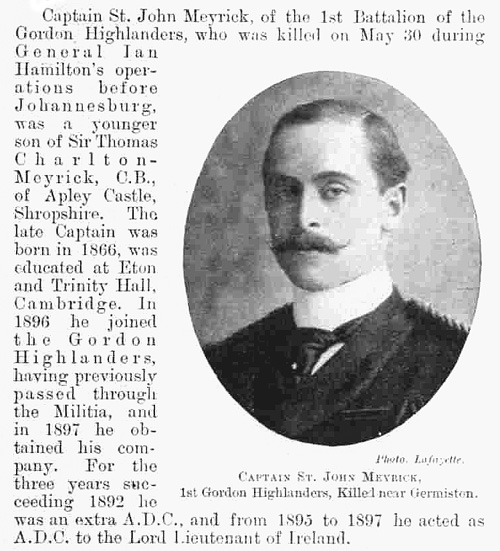
As a young man, Herbert Meyrick, was a keen cricketer. Several of his pictures in his scrapbook and photograph album show him and his fellow students in 1880’s cricket attire. Herbert was a well-known cross country rider and won the Foxhunters Steeplecase at Wenlock Races just two weeks before he died.

In July 1888 Herbert Meyrick was in the news after he and his student friends were aggressively approached by three lads in Windsor. These were, of course, the days of extreme class distinction in Britain. The aggressors were asking if Herbert and his friends were carrying any money. One boy, according to reports, was slapped. This event was recorded in Herbert’s scrapbook (left) where he pasted a news report of the scary event.
Attempted Highway Robbery By Boys.
William Barton, Charles Wilmot, and George Thatcher, boys about 17 years of age were charged with attempting to rob Edward Campion, a young student in the house of Rev. T Dalton at Eton College.
Edward Campion said: I am a student at Eton College. On Sunday morning and last, about half past 12 o’clock, I was in company with another student at Eton College named Meyrick, and we were walking along the footpath between Eton Wick and Chalvey. We met the three prisoners, and they asked me for a “copper”. I said I had not got one. They then asked me for a sixpence or a shilling, and I said I had not got one. I was then slapped on the face by Barton, with the back of his hand. Barton then held me, while, I think it was, Wilmot searched me. They found nothing. Our hats were knocked off. Then we got away, and we got into Chalvey village we saw a policeman, and we told him what had happened. I had no money about me.
In answer to Thatcher witness said: you stood on the iron bridge over the brook. I did not hear you say to the other prisoners, “let them alone, or you will get into trouble.”
Herbert Meyrick said: I am a student at Eton College. I was out on Sunday morning with Campion, and we were walking along the fields between Eton Wick and Chalvey, near the Shooting Butts, we met the prisoners. I saw two of them search Campion. They did not search me. The first thing they did was to last for “coppers”. I don’t know which of them it was that asked. One of them asked me for sixpence, and I said I had not got one. I went on to the iron bridge. I did not see it Campion struck, but I saw him searched. Thatcher stood on the bridge near me. I did not think Thatcher helped search Campion. The other two were by champion. I had two shillings, and I’d put it in one of my boots, thinking they might search me. They at last letter Campion go, and we went away, and when we got into the village we told a policeman. One other prisoners held Campion while another searched him.
Police constable Horne said: About half-past 12 o’clock on the morning of last Sunday, the 1st of July, I received a communication from the last two witnesses. In consequence of this, I went in the direction of the iron bridge, and met Barton and Wilmot. Thatcher was not then with them. The Eton gentlemen were with me. When I was within ten or twelve yards and Barton and Wilmot, before I had said anything, Barton said, “I did not search them. I the only held them.” I said, “Nobody said you did.” Wilmot and did not say anything. Barton said, “It’s no use telling lies. I held them, and you and Thatcher searched them.” Wilmot made no reply to that. I then went to Thatcher’s house, but he was not at home. The next morning I had talked them into custody, and Wilmot said, “I know nothing about it.” Barton said nothing.
The Magistrates thought there was no evidence against Thatcher, and therefore discharged him. He was called as a witness for the prosecution and said: I live at Chalvey Grove. On Sunday morning I met with the two prisoners, and was walking along the fields with them. We met the two young gentleman, and Wilmot said “Thank you for a copper.” The young gentleman said they had not got one. Wilmot said “We must have something.” Barton took hold of Campion, and I went on to the iron bridge over the brook. Upon looking back, I saw Campion’s pockets were turned out, and I heard him say “Leave me alone, there’s a dear fellow.” I said to the prisoners, “leave them alone, or else you will get yourselves into a row.” I was on the bridge then, and the other young gentleman was just behind me. I was about 10 or 12 yards from the two prisoners. I did not see who it was their turned Campion’s pockets out. Barton held me, and Wilmot searched him. After the young gentlemen had gone away, I stopped with the prisoners about five or 10 minutes, and then said “I shall go home to dinner.” I did not see Meyrick put money in his boot.
The chairman told prisoners this was a very disgraceful case. First of all they had begged of the young gentlemen, and then had attempted to rob them. If they were sent for trial they would meet with severe punishment. Formerly the Magistrates would not have had power to deal with the case, but as it was they could now would deal with it under the Summary Jurisdiction Act. It was a case that deserved very considerable punishment. They would each be sent to prison for one month with hard labour.
Bucks Herald – Saturday 07 July 1888:
Daring Highway Robbery.

William Barton, Charles Wilmot, and George Thatcher, youth’s about 17 years of age, whose parents live at Chalvey, were charged with an attempted highway robbery. It appeared that last Sunday morning, two young Eton College Students, named Edward Campion and Herbert Meyrick, were going along the footpath in a field between Eton Wick and Chalvey, when they met with the prisoners, who asked Campion for a “copper.” On his replying that he had not got one, they asked him for sixpence or a shilling. He said he had got anything, upon which Barton struck him in the face with the back of his hand. Barton then held him, while Wilmot searched him. Both Campion’s and Meyrick’s hats were knocked off. Meyrick hid two shillings which he had in one of his boots, thinking perhaps he might be searched also, but he was not a further interfered with. – Thatcher did not take part in what was done, and was therefore discharged. The other prisoners were sentenced to one month’s hard labour each.

Death and Memory
Herbert Meyrick was 34 years of age when he was drowned at Apley Pool in 1909. He was “was held in the best esteem of all who knew him”.
Herbert’s eldest brother was Colonel F. W. Meyrick, who commanded the Shropshire Imperial Yeomanry during South African War, and was wounded in action.
Another brother, Captain St. John Meyrick-Meyrick served for twelve years in the Gordon Highlanders, and was killed whilst gallantly leading his men against the Boers at Doornkop, near Johannesburg on May 29th, 1900, was buried in Maraisburg Cemetery in the presence of his comrades and many friends.
Herbert Meyrick served with Lord Methuen’s Column in the South African War.
News coverage of his death here.
